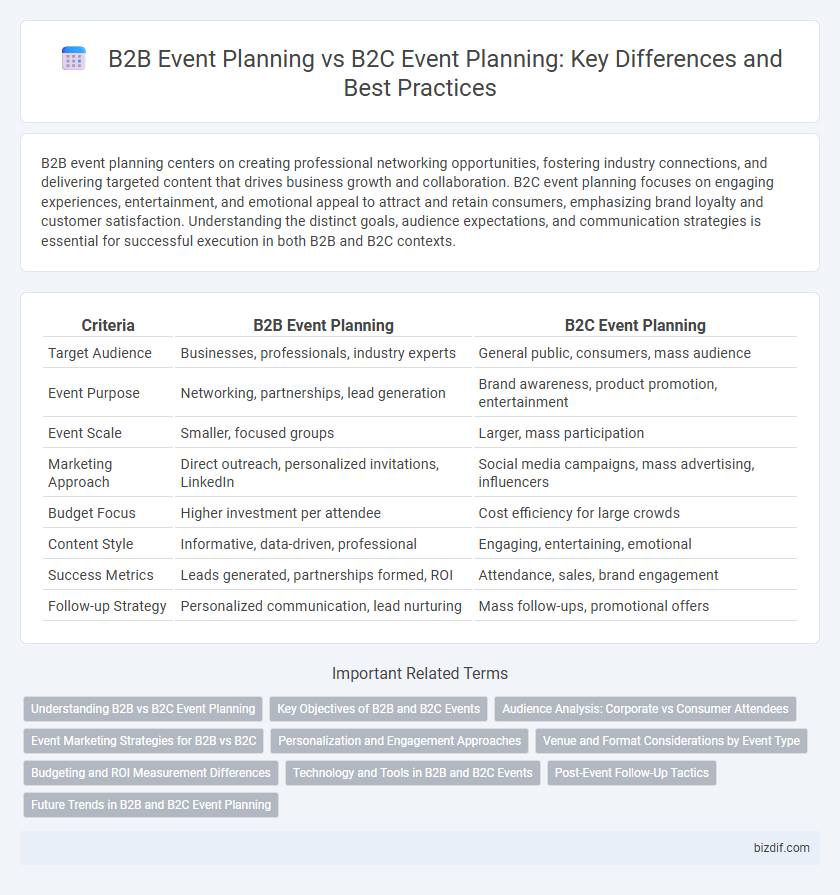B2B event planning centers on creating professional networking opportunities, fostering industry connections, and delivering targeted content that drives business growth and collaboration. B2C event planning focuses on engaging experiences, entertainment, and emotional appeal to attract and retain consumers, emphasizing brand loyalty and customer satisfaction. Understanding the distinct goals, audience expectations, and communication strategies is essential for successful execution in both B2B and B2C contexts.
Table of Comparison
| Criteria | B2B Event Planning | B2C Event Planning |
|---|---|---|
| Target Audience | Businesses, professionals, industry experts | General public, consumers, mass audience |
| Event Purpose | Networking, partnerships, lead generation | Brand awareness, product promotion, entertainment |
| Event Scale | Smaller, focused groups | Larger, mass participation |
| Marketing Approach | Direct outreach, personalized invitations, LinkedIn | Social media campaigns, mass advertising, influencers |
| Budget Focus | Higher investment per attendee | Cost efficiency for large crowds |
| Content Style | Informative, data-driven, professional | Engaging, entertaining, emotional |
| Success Metrics | Leads generated, partnerships formed, ROI | Attendance, sales, brand engagement |
| Follow-up Strategy | Personalized communication, lead nurturing | Mass follow-ups, promotional offers |
Understanding B2B vs B2C Event Planning
B2B event planning centers on fostering professional relationships, targeting industry-specific audiences with goals of networking, lead generation, and knowledge sharing, while B2C event planning prioritizes entertainment, brand experience, and direct consumer engagement. Key differences include budgeting strategies, attendee expectations, content complexity, and marketing channels, with B2B events generally requiring tailored messaging and detailed agendas. Successful event planners analyze the distinct audience motivations and leverage data-driven insights to optimize engagement and ROI for both B2B and B2C contexts.
Key Objectives of B2B and B2C Events
B2B event planning primarily aims to build professional relationships, generate leads, and facilitate networking among industry stakeholders, emphasizing ROI and long-term partnerships. B2C event planning focuses on brand awareness, customer engagement, and driving immediate sales through immersive experiences tailored to consumer preferences. Understanding these distinct objectives enables event planners to design strategies that effectively target either business professionals or end consumers.
Audience Analysis: Corporate vs Consumer Attendees
B2B event planning centers on in-depth audience analysis of corporate attendees, emphasizing professional roles, industry challenges, and business objectives to tailor networking opportunities and educational content. In contrast, B2C event planning targets consumer attendees by analyzing demographics, interests, and buying behaviors to create engaging, personalized experiences that drive brand loyalty. Understanding these distinct audience profiles is crucial for developing effective event strategies, marketing approaches, and content delivery that resonate with each group.
Event Marketing Strategies for B2B vs B2C
B2B event marketing strategies prioritize relationship-building through targeted networking sessions, educational content, and personalized engagement, focusing on decision-makers and industry professionals to drive lead generation and long-term partnerships. In contrast, B2C event marketing emphasizes emotional appeal, brand experience, and mass engagement via social media campaigns, influencer collaborations, and interactive activations to boost immediate sales and brand loyalty. Data-driven segmentation and content customization are critical in optimizing the effectiveness of campaigns for both B2B and B2C audiences.
Personalization and Engagement Approaches
B2B event planning emphasizes tailored content and networking opportunities that align with industry-specific goals, fostering professional relationships and lead generation. In contrast, B2C event planning prioritizes immersive experiences and emotional engagement to build brand loyalty and consumer excitement. Personalization in B2B relies on data-driven insights for targeted messaging, while B2C integrates interactive elements and entertainment to captivate diverse audiences.
Venue and Format Considerations by Event Type
B2B event planning requires venues equipped with professional facilities such as conference rooms and AV technology to support presentations, workshops, and networking sessions, often favoring structured formats like seminars or roundtables. B2C event planning prioritizes large, accessible venues that accommodate entertainment-focused, interactive formats like festivals, product launches, or experiential activations aimed at consumer engagement. Selecting the right venue and format depends on target audience size, event objectives, and the desired level of interaction, with B2B emphasizing functionality and B2C emphasizing experience and accessibility.
Budgeting and ROI Measurement Differences
B2B event planning typically involves higher budgets due to the need for specialized venues, technology, and targeted marketing aimed at industry professionals, whereas B2C events often allocate funds toward mass appeal and entertainment elements. ROI measurement for B2B events centers on lead generation, client acquisition, and long-term partnerships, using metrics like conversion rates and sales growth. In contrast, B2C event ROI is gauged through immediate ticket sales, attendee engagement, and brand awareness metrics such as social media reach and customer feedback.
Technology and Tools in B2B and B2C Events
Technology and tools in B2B event planning prioritize CRM integration, lead generation software, and advanced analytics to foster professional networking and measurable ROI. B2C events leverage social media platforms, mobile apps, and experiential technology to enhance attendee engagement and brand interaction. Both sectors utilize event management software, yet B2B solutions emphasize data-driven decision-making while B2C tools focus on personalized customer experience.
Post-Event Follow-Up Tactics
B2B event planning emphasizes personalized post-event follow-up through targeted emails, detailed surveys, and one-on-one meetings to nurture professional relationships and generate leads. B2C event planning focuses on engaging a broader audience by leveraging social media interactions, feedback forms, and promotional offers to build brand loyalty and encourage repeat attendance. Both strategies rely on timely communication and data analysis to optimize future event success and enhance attendee satisfaction.
Future Trends in B2B and B2C Event Planning
Future trends in B2B event planning emphasize hybrid models combining virtual and in-person elements to enhance global reach and engagement, leveraging AI-driven personalization to tailor networking opportunities. B2C event planning is moving toward immersive experiences using augmented reality (AR) and interactive technologies to create memorable brand interactions and increase attendee participation. Both sectors prioritize data analytics for real-time feedback and improved event ROI, adapting to evolving attendee expectations for seamless and personalized experiences.
B2B event planning vs B2C event planning Infographic

 bizdif.com
bizdif.com